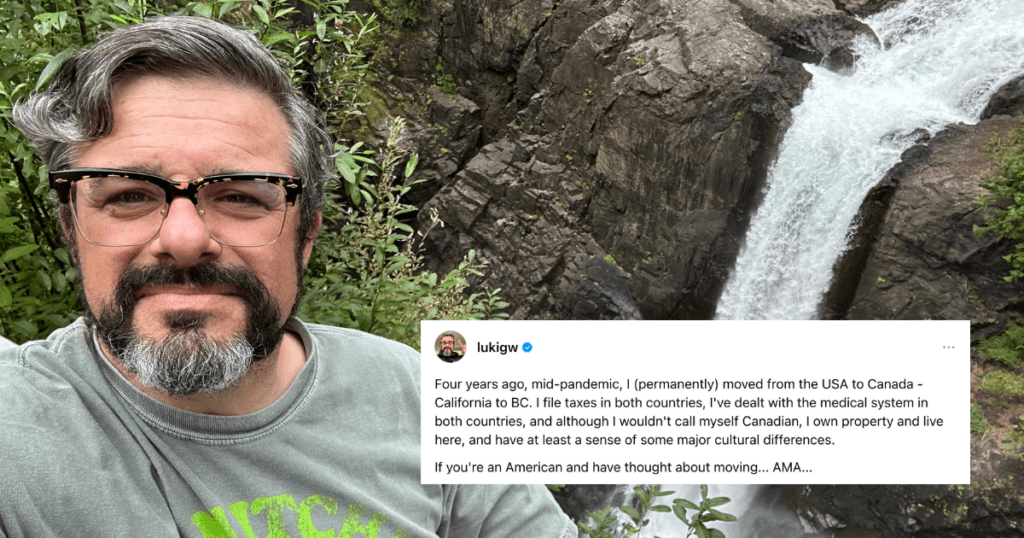An American man who moved to Canada with his wife four years ago, in the midst of the COVID-19 pandemic, is sharing about the “cumbersome” experience of moving north with thousands on social media. Lucas Wilson, who moved from California to B.C., took to Threads, in a post that generated more than 1,400 comments — and lots of curiosity.
Commenters’ questions ran the gamut from paying taxes to accessing healthcare, gun laws and the weather. And Wilson answered many of them on Threads, the micro-blogging platform that is Instagram’s answer to X formerly known as Twitter.
“I file taxes in both countries, I’ve dealt with the medical system in both countries, and although I wouldn’t call myself Canadian, I own property and live here, and have at least a sense of some major cultural differences,” he wrote.
In a video call with Yahoo Canada, Wilson says he was inspired to post about his experience since so many of his neighbours in Canada and friends in the U.S. have been interested in his and his wife’s thoughts on moving countries and the comparisons between the two.
“We’ve raised kids, we’ve dealt with health care and mortgages and we’ve done it on an adult level now in the U.S. and Canada,” he says.
Lucas Wilson shared on Threads his experience with moving from the U.S. to Canada. People had a lot of questions.
‘We were tired of the chaos in America’
In a video call with Yahoo Canada, Wilson says he was inspired to post about his experience since so many of his neighbours in Canada and friends in the U.S. have been interested in his and his wife’s thoughts on moving countries and the comparisons between the two.
“We’ve raised kids, we’ve dealt with health care and mortgages and we’ve done it on an adult level now in the U.S. and Canada,” he says.
Wilson and his wife decide to move to Canada, after living in L.A. for 20 years. It was a combination of wanting to be in a smaller place, closer to nature and in a different political climate.
“When your kids grow up and move out, that’s typically when you want a big life change,” he says. “We were tired of the chaos in America. We pay a lot in taxes and we wanted our money to go to a country and society whose morals and ethics were more aligned with what we believed in.”
What’s the difference between a permanent resident in Canada and a citizen?
According to the 2023 Annual Report to Parliament from Immigration, Refugees and Citizenship Canada, 437,000 new permanent residents were admitted into the country in 2022. Only 2 per cent — 10,415 — were from the United States.
According to the Canadian government’s website, permanent residents are entitled to many of the same benefits as citizens, like health care and a social insurance number, and can also study, work and live anywhere in the country. The main difference between a PR and a Canadian citizen is that they aren’t allowed to vote or be a candidate in elections.
Polite reputation precedes us
Wilson says Canadians live up to their reputation as polite people, a stark difference from his time in the U.S.
“The U.S. is a big country with lots of different places, but in my experience, it’s very much ‘I got mine, I’m not going to worry about you’.”
Wilson and his wife, who are both permanent residents, intend to apply for their Canadian citizenship when they are eligible. Since Wilson works in tech in virtual reality, B.C. was a good fit as it’s seen as a global hub for the industry. His wife Kelly is social learning specialist who still sees U.S. clients virtually and is working on being accredited in B.C.
For Canada to be such an immigration centre, … it’s very cumbersome.
Americans want to know how to move to Canada
The main question that came up on the viral social media post came from Americans looking for more insight on how to move up North.
“Americans were interested in the actual process of moving,” Wilson says.
He admits “there’s absolutely no way” he and his wife could have moved without an immigration lawyer to help make the long, complicated process a bit easier.
“For Canada to be such an immigration centre, … it’s very cumbersome,” he says.
Unless you’re First Nations, Canada is like the U.S., a nation of immigrants.
Biggest differences between U.S. and Canada: Healthcare and Indigenous history
Wilson says the single biggest difference between Canada and the U.S. is the health-care system and accessing care.
One reply in the thread pointed to the jarring change. In the U.S., you “walk into any medical facility, first interaction is typically: ‘How are you going to pay for this,'” he wrote.
“The U.S. has a strange healthcare system but I was used to it,” he told Yahoo Canada.
Another big difference Wilson has noticed is that there is more presence of Indigenous people’s role and history in Canada.
“There’s a zeitgeist in Canada,” he says. “You’re always thinking of First Nations. Whether it’s a land acknowledgement, or a sign. There’s a lot more daily thought of Canada’s role and interaction with First Nations, then there is in the U.S.”
Wilson admits there was a lot of xenophobia in the comments of his thread, particularly from Canadians, though he’s found that people are generally emboldened to say things online that they likely wouldn’t articulate in real life.
“I find it ironic, since unless you’re First Nations, Canada is like the U.S., a nation of immigrants,” he says.
Source link : http://www.bing.com/news/apiclick.aspx?ref=FexRss&aid=&tid=670833a0ac1f4ea99ec0bc2ff87ccf13&url=https%3A%2F%2Fca.news.yahoo.com%2Fmoving-to-canada-from-us-man-tired-of-the-chaos-in-america-now-lives-in-bc-shares-tips-in-viral-post-182920421.html&c=14495828616635984125&mkt=en-us
Author :
Publish date : 2024-10-10 07:33:00
Copyright for syndicated content belongs to the linked Source.
